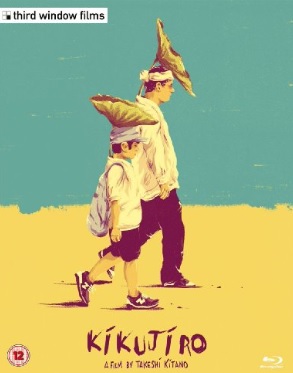
(A.k.a. KIKUJIRO NO NATSU; KIKUJIRO'S SUMMER)
A road movie whose primary concern is allowing its characters - and not just the central ones - time to develop and resonate, KIKUKIRO shows Japanese filmmaker "Beat" Takeshi Kitano at his most assured as a director.
It opens with young Masao (Yusuke Sekiguchi) walking through his home town in the Shitamachi suburb of Tokyo, discussing with a schoolmate how the pair of them are going to spend their summer holidays. Neither boy has much planned. From the very start, the languid pace and whimsical sense of yearning for childhood is apparent, but so - in the form of subtle background details such as the homeless people passed out on the street, not even acknowledged by the oblivious kids - is a foreboding lack of sentimentality.
Returning to his grandmother's modest home, Masao discovers he's received a package through the post. Inside it contains a photograph of his estranged mother, who now lives several hundred miles away. Suddenly, Masao has a very clear of how he wants to spend his summer: travelling to find his mum.
Learning she can't dissuade him from his plight, his neighbour (Kayoko Kishimoto) suggests that her husband Kikujiro (Kitano) join the lad on his road trip. A gambler and a bit of an all-round cad, Kikujiro reluctantly agrees - but initially sees the journey as little more than a chance for him to have some fun.
Following an altercation outside a restaurant in which Masao narrowly escapes the attentions of a child molester, Kikujiro's attitude to the task at hand changes. He determines to get the boy safely to his mother's new address in Toyohashi - though, naturally, he's still on the lookout for dodgy deals of his own along the way.
What follows, split into chapters that act as entries in Masao's holiday journal, are essentially vignettes where our protagonists meet an array of lively, beguiling characters - the yakuza, a friendly juggler (Fumie Hosokawa) and her boyfriend, a wandering poet (Nezumi Mamura) and so on. Kikujiro is hardly the ideal role model for the boy; such are his predilections for gambling, stealing (including the amusing procurement of a taxi to aid their journey) and talking back to the wrong people.
But, along the way, we learn how these two seemingly disparate characters actually have a great deal in common. Both feeling isolated from Japanese society and embittered by their inability to fit in, there is a shared sadness in their eyes which draws them together spiritually. Kikujiro sees himself in Masao and so, in his own brusque way, becomes protective of the child. Masao warms to his mentor in a slow, believable manner which will melt the heart of any viewer.
The events that transpire are relevant but the film is about much more than whether the mother is found (at which juncture, the journey for us - and our protagonists - is only halfway through). This is tale about people, and the human spirit. It's about disappointment, about belonging, about friendship, about coping, about love.
Kitano has always been good at striking a keen balance between drama and comedy. He achieves such with a casual ease. And KIKUJIRO is no different in this respect. But, whereas films of his like VIOLENT COP and SONATINE also rely on regular outbursts of unexpected violence, KIKUJIRO holds back on those elements. The yakuza do inevitably make their presence felt, but their inclusion is much more peripheral to events on this occasion. KIKUJIRO is a much more sweet-natured film, though as mentioned earlier, without the liberal doses of saccharin that a lesser filmmaker would've undoubtedly blighted the film with.
Third Window Films have released KIKUJIRO onto UK blu-ray.
The film is presented uncut (121 minutes, 44 seconds) as an MPEG4-AVC file, offering a full 1080p HD transfer which adheres to the correct aspect ratio of 1.85:1. The 16x9 picture is glorious. Rich colours and vivid detail make this a truly striking proposition, retaining an authentic filmic feel while proffering an attractively bright and dense palette.
Japanese audio has been cleaned up, via an impressive 2.0 Master Stereo DTS-HD mix which is as impressive with its rendering of Joe Hisaishi's stirring score as it is at making the film's quieter, more contemplative moments stand out. Optional English subtitles are typo-free and easily readable at all times.
The disc opens to an animated main menu page. From there, a pop-up scene selection menu allows access to the film via 16 chapters.
There's only one bonus feature, but it's a pretty epic one: a 93-minute Making Of. Presented in window-boxed fashion, this comes with Japanese audio and burned-in English subtitles. It's a fascinating insight into Kitano at work as both a director and an actor. As you can imagine, he's extremely focused as both. His crew display a real team ethic throughout, while the tone of the shoot is as amiable as it is diligent. Including plenty of behind-the-scenes footage, a few bloopers and plenty of light-hearted banter in-between takes, this is a fabulous companion piece to the main feature.
Following on from their excellent HD release of HANA-BI, Third Window Films strike gold again with more fine blu-ray treatment of another Kitano classic. I hope they get to release more of his films soon (my fingers are crossed for VIOLENT COP in particular ...).
Review by Stuart Willis
| Released by Third Window Films |
| Region B |
| Rated 18 |
| Extras : |
| see main review |